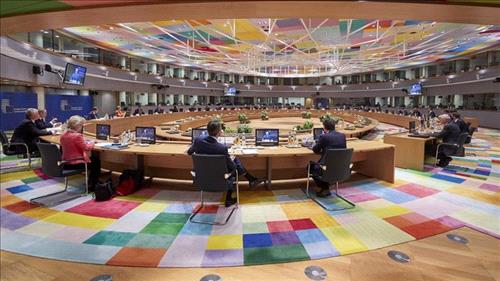Ammon News - AMMONNEWS - European Council President Charles Michel has offered a revised plan for the European Union's (EU) proposed economic recovery fund to break a deadlock between the bloc's 27 leaders on the second day of a summit in Brussels, according to a document, diplomats and officials.
The EU leaders are meeting on Saturday for further talks over a 750 billion euros ($858bn) stimulus plan to breathe life into economies ravaged by the coronavirus pandemic after a meeting that ran late into Friday evening ended without a deal.
To assuage concerns by the northern camp of thrifty EU countries led by Dutch Prime Minister Mark Rutte, the share of free grants in the proposed recovery fund would be reduced to 450 billion euros from 500 billion euros.
This, along with plans for an "emergency brake" on the disbursement of funds, would appease wealthy northern states who want conditions attached to grants and would prefer to see those countries worst affected by the coronavirus crisis take loans.
The proposal would also increase rebates on the core EU budget for Austria, Denmark and Sweden.
The leaders spent Friday discussing a proposal put forward by Michel that outlined the $858bn recovery fund and a 1 trillion euros ($1.14 trillion) long-term budget for 2021-27.
Officials on Friday night said a thrifty camp of wealthy northern states led by the Netherlands stood its ground on access to the recovery fund, in the face of opposition from Germany, France, southern nations Italy and Spain, and Eastern European states.
The proposed sums under discussion will be funnelled mostly to Mediterranean coast countries worst affected by the pandemic.
Diplomats said the 27 remained at odds over the overall size of the package, the split between grants and repayable loans in the recovery fund and rule-of-law strings attached to it.
But the main stumbling block was over vetting procedures to access aid, an EU official said, with Rutte demanding that one country could block payouts from the fund if member states backslide on economic reform.
"If they want loans and even grants then I think it's only logical that I can explain to people in the Netherlands ... that in return those reforms have taken place," Rutte said on Friday, estimating the chances for a deal at fifty-fifty.
Polish Prime Minister Mateusz Morawiecki was even more gloomy. As the leaders broke up for the day, he tweeted that they were divided by a bundle of issues and said it was "highly probable" that they would fail to reach a deal on Saturday or even on Sunday if the summit drags past its scheduled two days.
'Very difficult negotiations'
German Chancellor Angela Merkel, who celebrated her 66th birthday on Friday around the negotiating table in Brussels, was also cautious on chances for an agreement, envisaging "very, very difficult negotiations".
After initial elbow bumps between the leaders - all wearing face masks - and birthday gifts for Merkel and Portuguese Prime Minister Antonio Costa, tense meetings followed in the evening with Rutte and Hungarian Prime Minister Viktor Orban.
Orban, whom critics accuse of stifling the media, academics and NGOs, threatened to veto the entire plan over a mechanism that would freeze out countries that fail to live up to democratic standards.
With EU economies deep in recession and immediate relief measures such as short-time work schemes running out, the spectre of months of hardship and discontent is looming.
The EU is already grappling with the protracted saga of Britain's exit from the bloc and is bruised by past crises, from the financial meltdown of 2008 to feuds over migration.
Another economic shock could expose it to more eurosceptic, nationalist and protectionist forces, and weaken its standing against China, the United States or Russia.
"The stakes couldn't be higher," said European Commission President Ursula von der Leyen. "The whole world is watching us."
Despite wrangling over medicines, medical gear, border closures and money, the EU has managed to agree on a half-a-trillion euros ($571.4bn) scheme to cushion the first hit of the crisis.
Mediterranean countries now want the recovery financing to prevent their economies from taking on ever-greater burdens of debt.
"The big picture is that we are faced with the biggest economic depression since World War II," Greek Prime Minister Kyriakos Mitsotakis said. "We need ... an ambitious solution because our citizens expect nothing less from us."
*Agencies








 comment replay
comment replay 